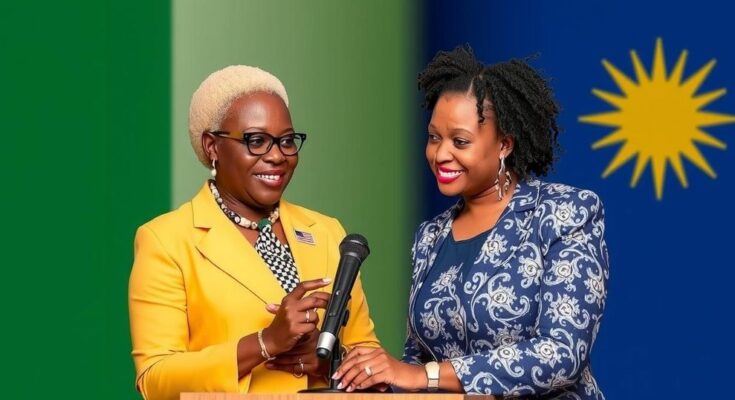Namibia’s Vice President Netumbo Nandi-Ndaitwah leads early results in a presidential election marked by technical issues and opposition claims of illegality. Voter turnout faced challenges, prompting a three-day extension. Public dissatisfaction with the ruling party amid economic difficulties complicates the electoral landscape, leading to anticipated legal challenges from opposition parties.
Namibia’s Vice President, Netumbo Nandi-Ndaitwah, currently leads in the initial results of the presidential election held on November 27, 2024. This election faced significant challenges, including technical issues that prompted the Electoral Commission to extend voting for an additional three days. As a result, opposition parties are contesting the election’s validity, claiming the prolonged voting period was illegal and detrimental to the voting process.
As of the latest counts, Nandi-Ndaitwah has garnered approximately 56% of the votes from the 220,000 ballots counted, while her closest competitor, Panduleni Itula from the Independent Patriots for Change party, trails with about 27%. Namibia, a country that has experienced a largely stable electoral history since its independence from South Africa in 1990, is now facing allegations of electoral misconduct that could undermine its democratic credibility.
The concerns surrounding this election are compounded by economic challenges plaguing the nation, including high unemployment rates and government corruption, which have elicited frustration among the populace. Nandi-Ndaitwah, who is poised to become Namibia’s first female president if elected, represents the ruling SWAPO party, which has held power since independence but has faced increasing discontent from the public.
Opposition leaders, including McHenry Venaani of the Popular Democratic Movement, are planning to mount a legal challenge against the election results, emphasizing the need for a political system that serves all citizens equitably. Despite the controversy, the Electoral Commission has stated that a rerun of the election will not occur, dismissing calls from opposition parties for such measures.
The recent presidential election in Namibia, characterized by significant logistical problems, reflects deeper societal issues, including dissatisfaction with the ruling party, SWAPO. Economic hardships such as high unemployment rates and corruption scandals have marred the party’s storied governance since independence. These factors have resulted in increased scrutiny of electoral processes, with opposition parties alleging violations that threaten the integrity of Namibia’s democratic institutions. The context of this election affects not only the immediate political landscape but also public trust in governance as a whole.
In summary, Namibia’s presidential election, initially leading with Vice President Netumbo Nandi-Ndaitwah, has been overshadowed by allegations of electoral misconduct and claims from the opposition regarding the legality of the extended voting period. As the country grapples with economic challenges and public dissatisfaction, the upcoming legal challenges and their implications for Namibia’s democratic integrity will be critical in shaping the nation’s political future.
Original Source: apnews.com




